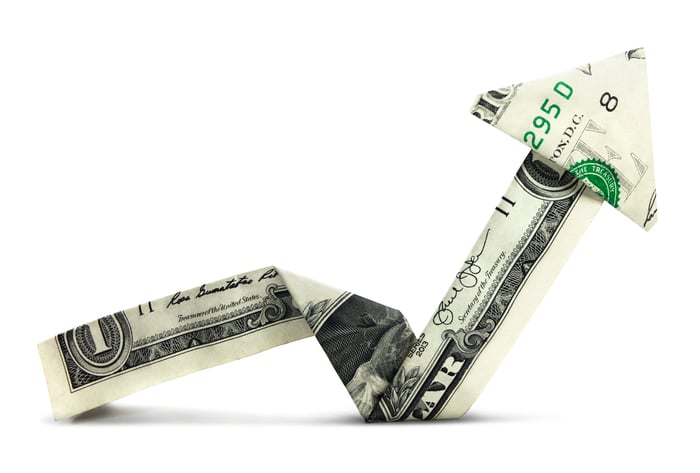The U.S. stock market has diverged sharply from the rest of the world. This is a trend that has been ongoing since at least 2011, and for good reason. The U.S. economy is stronger and in better shape than most of the world. Growth in the U.S. stock market has been so good, relative to international markets, that U.S. stocks have become relatively more expensive: The price-to-earnings ratio of the S&P 500 is 15.7 as of Dec. 18, while the P/E of the EURO STOXX 50, a broad measure of Europe's 50 leading blue-chip stocks, is 12.9, and the P/E of the Hang Seng Index, which tracks the Hong Kong market, is 10.8 A higher P/E could mean lower returns in the future, so bargain hunters may want to look abroad for opportunities.
However, U.S. investors buying foreign securities -- whether through a mutual fund or an ETF -- need to be aware of the currency risk. Currency risk occurs on the exchange of U.S. dollars for the local foreign currency and vice versa. For example, when you buy an international mutual fund, the mutual fund manager buys shares of foreign companies in the local currency. If the local currency is stronger -- meaning worth more than the U.S. dollar -- your mutual fund manager can't buy as much.

Image source: Getty Images.
The same risk applies when the mutual fund manager sells a foreign security. If, for example, you want to sell the foreign mutual fund, the mutual fund manager has to redeem your shares of the fund in the local foreign currency and then exchange them for U.S. dollars, because you are a U.S. investor. If the dollar is worth more than the foreign currency, then your manager can't buy as many U.S. dollars, and in this case, you lose money on the currency exchange.
It's as if you've planned a trip to Europe when the Euro is weak and the dollar is stronger. Initially, your money will go further in Europe, but when the trip ends, you have to redeem your unspent Euros for U.S. dollars, and your Euros won't buy as many dollars.
This is basically how currency risk works, and it's the reason that a weaker dollar benefits Americans investing abroad.
Recently, the U.S. dollar has grown stronger against many international currencies. If the stronger dollar continues to play out, which it could, the currency risk may weigh on U.S. investors investing abroad. How does the dollar become stronger or rally? It's complicated, as you can imagine, but it's a bit like a popularity contest. If investors all over the world see the U.S. as a strong and stable economy and the interest rates here in the states are higher than on foreign bank accounts, that will attract more foreign investors to exchange their currency for U.S. dollars. And more people buying U.S. dollars bids up the popularity, and thus the value, of the dollar. With our Federal Reserve expected to raise interest rates next year, this could mean our banks will pay higher interest than other countries, and this will attract foreign investors to buy U.S. dollars.
How to mitigate currency risk
One way to invest abroad but minimize the impact of a stronger dollar is to invest in a currency-hedged exchange-traded fund. Such ETFs track a basket of foreign securities like any foreign ETF, but the manager also employs a hedge if the dollar rallies or becomes stronger. The manager does this through the use of forward contracts, or the right to buy the dollar at a fixed price in the future. For example, a manager may buy a forward contract that guarantees the right to buy the U.S. dollar at a future price that is favorable in case the dollar rallies. For example, if the currency of an international market falls by 2% over the course of the month against the U.S. dollar (meaning the dollar rallied), the forward contract should generate a gain that offsets the currency loss. This mitigates exposure to fluctuations in the U.S. dollar and non-U.S. currencies.
Some ETFs simply hedge against the currency of the market they're invested in, while others track multiple currencies. For instance, the MSCI ACWI captures the returns of 23 foreign developed countries and 24 emerging markets, with no currency hedge. Meanwhile, the MSCI 100% Hedged to U.S. Dollar Index tracks the same foreign securities of the MSCI ACWI Index but hedges the currency, buying forward contracts on over 10 currencies including the Euro, the Japanese Yen, the Canadian dollar, and others. Over the past year, as of the end of November, the MSCI ACWI was down 0.98%, while the MSCI 100% Hedged to U.S. Dollar Index was up 1.49% . If the dollar continues to strengthen, then a dollar-hedged ETF can help lessen the currency risk. And one less risk is a generally a good thing.
Of course, all investments involve some level of risk. If the dollar weakens, you may have been better off just buying the index without hedging. A compromise may be to hedge some of your currency risk and leave the rest unhedged.




